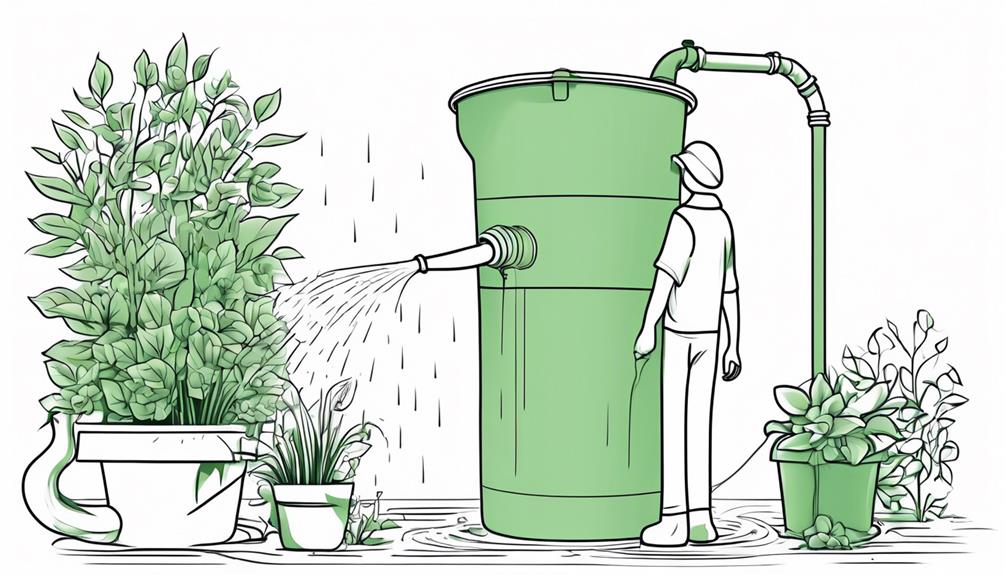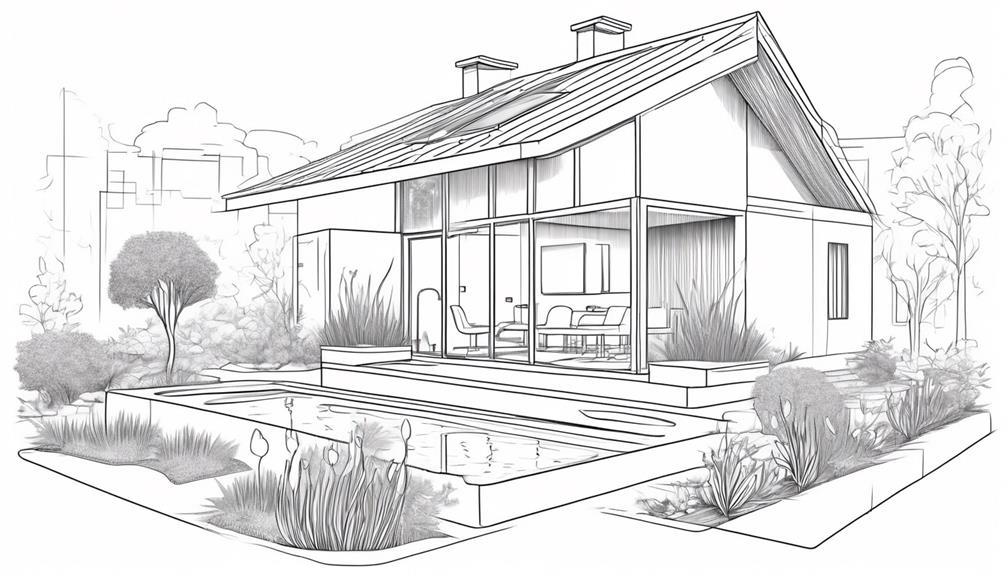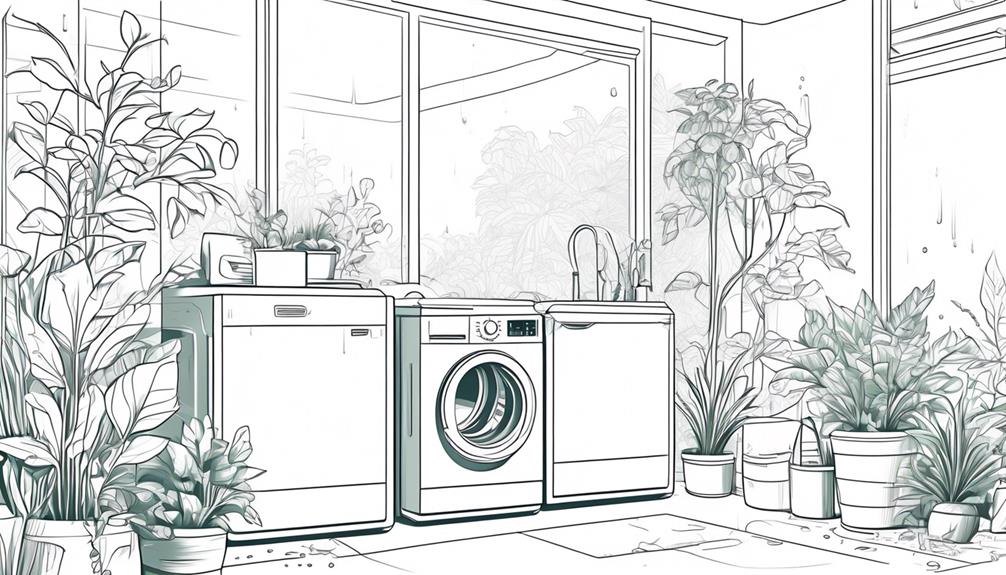You've probably heard the saying, 'Every drop counts,' and when it comes to sustainable water conservation, this rings especially true. Making small adjustments in your daily routine can have a significant impact on preserving our planet's freshwater resources.
From simple habits like turning off the tap while brushing your teeth to more advanced techniques such as rainwater harvesting, there are numerous ways you can contribute to water conservation efforts. Let's explore some effective tips that can help you make a difference and play your part in ensuring a brighter future for our environment.
Key Takeaways
- Utilize low-flow shower heads and be mindful of water consumption indoors
- Implement deep-soak lawn watering and strategic outdoor cleaning practices
- Regularly check for and promptly repair water leaks to prevent wastage
- Explore innovative methods like rainwater harvesting and greywater recycling for sustainable water conservation
Importance of Water Conservation
Water conservation is crucial in preserving Earth's limited freshwater resources for future generations. With only 3% of the world's water being freshwater, it's essential to reduce water wastage and save water wherever possible. This precious and essential resource is unequally distributed globally, making it even more imperative to prioritize water conservation efforts.
Conserving water isn't just about the present but also about securing a sustainable future. By implementing simple yet effective water conservation practices, you can contribute significantly to the preservation of this vital resource. Small changes in your daily routine, such as fixing leaky faucets, using water-efficient appliances, and being mindful of water usage, can make a substantial difference in reducing water consumption.
Every drop counts when it comes to water conservation. By being conscious of your water usage and making conscious efforts to save water, you play a crucial role in ensuring that there's enough freshwater available for generations to come. Start today by taking steps to conserve water and make a positive impact on the environment.
Efficient Indoor Water Use
To maximize your indoor water efficiency, consider incorporating energy-efficient devices like low-flow shower heads. These devices can significantly reduce water consumption without sacrificing water pressure, allowing you to conserve water effortlessly.
In addition to upgrading your fixtures, there are several simple habits you can adopt to ensure efficient use of water indoors:
- Run dishwasher and laundry only when full to maximize water efficiency.
- Shorten shower time to save water and reduce unnecessary usage.
- Soak dishes before washing to minimize water usage during cleaning.
- Turn off the tap when not in use to prevent wastage and conserve water.
Outdoor Water Saving Practices
Consider extending your water-saving efforts outdoors by implementing simple yet effective practices to conserve water in your lawn and garden.
Deep-soaking your lawn allows water to reach the roots, reducing the frequency of watering. Position sprinklers strategically to water specific areas like the lawn or garden, avoiding wasteful watering.
When cleaning outdoor surfaces, opt for a broom over a hose to save water. For washing your car, use a pail of soapy water and only rinse with a hose when necessary to conserve water.
Regularly check for leaks in outdoor water lines to prevent any unnecessary water wastage. By being mindful of how you use water outdoors, you can contribute to significant water savings and help maintain healthy plants and gardens.
Preventing Water Leakage
Hey, you! When it comes to preventing water leakage, it's crucial to regularly check your pipes, faucets, and hoses for any leaks.
Make sure to fix those pesky leaks promptly to save water and prevent potential damage.
Using a water meter can also help you detect hidden leaks, so be proactive in maintaining your plumbing to conserve water efficiently.
Leak Detection Techniques
Check regularly for leaks in your faucets, pipes, hoses, and couplings to prevent water wastage and ensure efficient water use. Here are four effective leak detection techniques to help you in your water conservation efforts:
- Use food coloring in the toilet tank: Add a few drops of food coloring to the tank and if color appears in the bowl without flushing, you have a leak.
- Utilize water meters: Monitor your water meter reading before and after a two-hour period when no water is being used to detect hidden leaks.
- Be mindful of outdoor leaks: Inspect outdoor faucets, irrigation systems, and hoses regularly to catch leaks early and prevent water waste.
- Recycle water: Consider reusing grey water from sinks, bathtubs, and laundry for plant irrigation to further conserve water resources.
Repairing Leaky Fixtures
To prevent water leakage and conserve water, regularly inspect and promptly repair any leaks in your faucets, pipes, and toilets. Fixing leaks in pipes is crucial for water-saving efforts.
A simple method to check for toilet leaks is by adding food coloring to the tank; if color appears in the bowl without flushing, there's a leak. Replace worn-out washers or seals in faucets to prevent drips.
Consider installing water-saving showerheads and faucet aerators to reduce water wastage. For persistent leaks, hiring a professional plumber can ensure effective repair and water conservation.
Utilizing water-efficient appliances and fixtures not only minimizes water usage but also supports sustainable water conservation practices. Taking these steps will help you save water and contribute to a greener environment.
Rainwater Harvesting Techniques

Ready to explore how you can make the most of rainwater on your property?
Let's talk about collecting rainwater efficiently, finding the best storage solutions, and discovering the multiple benefits of using this natural resource wisely.
Get ready to dive into simple yet effective techniques that can help you conserve water and reduce your environmental impact.
Collection Methods
Consider incorporating a rain barrel into your home's water collection system to efficiently gather rainwater from your rooftop and gutters. By implementing this method, you can significantly reduce your water usage and contribute to sustainable practices.
Here are some additional techniques to enhance your rainwater harvesting efforts:
- Use a downspout diverter: Direct rainwater from the roof to a storage container effectively.
- Implement a rain chain system: Guide rainwater into a collection vessel using a simple and aesthetic method.
- Install a more complex harvesting system: Consider systems with filters and pumps for larger-scale water collection.
- Explore alternative uses: Utilize collected rainwater for irrigation and other non-potable purposes to maximize its benefits.
Storage Solutions
For efficient rainwater harvesting, installing rain barrels is a practical and eco-friendly solution to store and utilize rainwater effectively.
You can also implement a rainwater harvesting system to capture and store rainwater for various purposes around your home.
Consider using cisterns or tanks for storing harvested rainwater, especially for irrigation and other non-potable uses.
For larger quantities, underground storage tanks are a great option to ensure extended use of rainwater.
For space-efficient storage, explore the use of water bladders or flexible storage tanks.
Additionally, to conserve water further, you can mulch around trees and plants to retain moisture in the soil, reducing your water footprint while keeping your garden healthy.
Usage Benefits
To fully reap the benefits of rainwater harvesting techniques, harness the natural water resources efficiently and reduce your reliance on municipal water supply systems. By implementing rainwater harvesting, you can make a significant impact on sustainable water use. Here are four ways rainwater harvesting techniques can benefit you:
- Reduced Water Bills: Using rainwater for tasks like watering the lawn can lead to cost savings on water bills.
- Self-Sufficiency: By relying on harvested rainwater, you promote self-sufficiency in water supply.
- Less Strain on Public Resources: Decreasing your reliance on municipal water reduces strain on public water resources.
- Mitigating Runoff: Rainwater harvesting helps mitigate stormwater runoff, reducing erosion and pollution.
Embrace rainwater harvesting to conserve water effectively and sustainably!
Greywater Recycling Methods

Greywater recycling methods can effectively reduce water consumption by repurposing water from sinks, bathtubs, and laundry for sustainable plant irrigation. Implementing simple greywater recycling systems is a practical way to minimize water usage.
By utilizing eco-friendly soaps and cleaners, you can ensure that the greywater collected is safe for reuse. Harvesting greywater using a bucket or a dedicated system allows you to channel this water towards irrigating your plants, thus conserving fresh water resources.
It's essential to follow guidelines set by the Environmental Protection Agency (EPA) to ensure that greywater recycling methods are implemented correctly and safely. By incorporating greywater recycling into your daily routine, you not only contribute to water conservation efforts but also reduce your environmental impact.
Start small by collecting greywater and using it to nourish your plants, taking a step towards a more sustainable way of living.
Sustainable Irrigation Strategies
Consider utilizing drip irrigation as a sustainable strategy to deliver water efficiently directly to plant roots, minimizing wasteful evaporation. This method not only conserves water but also ensures that the plants receive the water they need without excess going to waste.
In addition to drip irrigation, there are several other sustainable irrigation strategies you can implement to promote water conservation and efficient use in your garden or landscape:
- Implement rainwater harvesting systems: Collect and store rainwater to use for irrigation purposes, reducing reliance on freshwater sources.
- Employ soil moisture sensors: Use technology to monitor soil moisture levels and adjust irrigation schedules accordingly, preventing overwatering.
- Consider using native and drought-resistant plants: These plants are adapted to the local climate and require less water, reducing the need for frequent irrigation.
- Utilize mulch: Mulching around plants helps retain soil moisture, suppresses weed growth, and reduces water evaporation from the ground.
Water-Efficient Appliances

When choosing appliances to conserve water, opt for models with water-saving features such as low-flow showerheads. These appliances are designed to minimize water wastage without compromising on performance. By selecting water-efficient appliances, you can significantly reduce your household's water consumption and contribute to sustainable water conservation efforts.
Here is a comparison table to help you understand the benefits of water-efficient appliances:
| Appliance | Water-Saving Feature |
|---|---|
| Low-flow showerheads | Reduces water usage while maintaining water pressure |
| Automatic dishwashers | Use only for full loads to save water |
| Washing machines | Opt for high-efficiency models to conserve water |
| Faucet aerators | Install low-flow aerators to reduce water wastage |
| Water-efficient toilets | Minimize water per flush for efficient usage |
Community Water Conservation Initiatives
To boost community engagement in water conservation, consider launching interactive educational workshops and seminars in local neighborhoods. These initiatives play a crucial role in raising awareness and promoting sustainable practices within the community.
Here are some effective ways to kickstart community water conservation efforts:
- Initiate educational workshops: Educate community members on the importance of water conservation and provide practical tips on reducing water usage at home.
- Collaborate with local authorities: Work together with local government bodies to spread awareness about water-saving campaigns and encourage participation in conservation efforts.
- Establish community gardens: Create green spaces with water-efficient irrigation systems and native plants to showcase sustainable gardening practices.
- Organize clean-up events: Engage the community in cleaning local water sources to protect them from pollution and preserve the quality of the water supply.
Frequently Asked Questions
What Are the 5 Methods of Water Conservation?
When it comes to conserving water, you can make a difference by using water-efficient appliances, fixing leaks promptly, installing efficient irrigation systems, taking shorter showers, and teaching kids about sustainable living practices.
What Are the Sustainable Practices of Water Conservation?
To conserve water sustainably, use water-efficient devices, drought-resistant plants, fix leaks promptly, reuse water for irrigation, and run full loads in appliances. These practices help reduce wastage and promote a more environmentally friendly approach to water usage.
How Can We Ensure Water Sustainability?
Ensure water sustainability by using water-saving devices, checking for leaks, adopting efficient practices like deep-soaking lawns, installing water-saving appliances, and encouraging others to embrace conservation. Take small steps that collectively make a significant impact on the environment.
What Are the Strategies for Water Conservation?
To conserve water effectively, focus on full loads for dishwashers and washing machines, install water-saving fixtures, opt for short baths, and fix leaks promptly. Deep-soak your lawn and avoid watering non-plant areas for efficient gardening.
Conclusion
Congratulations! By following these effective tips for sustainable water conservation, you've become a water-saving superhero!
You've mastered the art of conserving water and are now a champion for our planet's freshwater resources.
Keep up the great work and continue to inspire others to join you on this important mission.
Remember, every drop counts, and together, we can make a big splash in preserving our precious water for future generations.
Well done!
